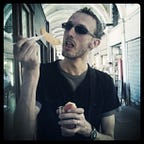#3 Film in Light and Motion : “Wine for the Lobby Boy”
Things can often happen in a movie that we don’t always expect; things that evoke a memory long after the movie is over. They are not always choices that are primary to a plot but choices that exist in the form of creative layers — be it born on the page or discovered during that fleeting moment on a sound-stage. Sometimes, acting on impulse can find moments, as if by accident. Or by the virtue of instinct, making use of a conveniently placed set piece or prop. What I’m talking about are objects that are within the scene, be it set in place within the frame or already in hand for the actor to introduce, to work with, be it scripted or not. It’s about the things that relate, directly or indirectly to the world you want audiences to remember. Objects, props, set accessories are all there to provide insights into characters, anything from a nod, a quirk to a full blown visual tapestry that threads everything together, through its own form of code. These things can leave an indelible impression.
EXHIBIT B: “WINE FOR THE LOBBY BOY”
Let’s get straight to this one with minimal setup. The 2014 movie, The Grand Budapest Hotel, by Wes Anderson is nothing short of a dense treasure trove of detail. I’m sure that this won’t be the last time I talk about this movie and the details that pop.
The concierge for the hotel, Gustave is introduced to a new Lobby Boy, named simply, Zero. His name carries a connotation that he is “a nobody”. After a brief interview in which we see the power play where Gustave is master, Zero is the perfect servant. We move forward briefly to the death of Madame D –one of the hotels regular guests of whom Gustave has relations with. In a way, he is no different than zero. He serves aged women to ensure their wealth flows his way. The news of her death has Gustave feel he must leave the hotel, take his new lobby boy on a train journey to see Madame D as she lies in rest. Before he leaves he instructs the lobby boy to, in his words: “bring a bottle of the Pouilly-Jourve ’26 in an ice bucket with two glasses so we don’t have to drink the cat-piss they serve in the dining car.”
And we let it be said that this is what the Lobby did.
Now, when we look at that statement, we immediately think one bottle, two glasses — how thoughtful. Little did we know that when we enter the next scene where we’re in the first –class state-room on the express to Lutz. As I read from the script:
the snowy foot-hills of the Zubrowskian Alps whiz by outside. M Gustave and Zero each hold a glass of chilled white wine. There are tears in M Gustave’s eyes.
The scene however is shot like this: Gustave sits across from his Lobby Boy and front and off set left is the lobby boys glass sat on a train top table. Gustave holds his glass but never sips his… Pouilly-Mourvèdre ’26. Neither is drinking the wine. We get the feeling that Gustave will take a sip, or glut, or do something… We try to listen to the dialogue but something makes us play out who will drink what and when… drinking business instead. With the lobby boy, we are not so sure if he wants to drink his wine. We then wonder, is it really his glass or is it merely a gesture of social politeness that cannot be taken up due to the restrictions that come with the role of the lobby boy. He’s never off duty.
The “Fascist” officers enter the car and cause a fracas, and even though there is chaos in that little tightly packed room, the glasses in the foreground now both placed centrally are never disturbed.
The glasses remain at the bottom of the frame after the officers leave. Finally Gustave gives up on his speech and the scene ends with him finally taking that drink to his lips. The lobby boy as always sits still, never once touching his drink. Why would he? It would destroy the very foundations that his character rests upon. Besides, his having but not being able to share… its funny right?
In a way, we as an audience, when fixating on the detail of the wine, sit there and wait almost impatiently for somebody to take a drink. It’s not as if the glasses are set away from us. They are front and center, close up and almost in our reach. If they’re not going to drink that wine then, bloody hell, I’m going to reach in and…….
Inaction is a choice by their character. A choice made purely from their quirks, relationships and their core beliefs.
This leads me to conclude that; we never know what happened to lobby boy’s glass of Pouilly-Jourve ’26. But that is the beauty of finding these little touches. Creating a visual, subtle detail that enhances a scene. It can inform us of something significant about the nature of a character or by nature of the character’s choice when interacting with or ignoring that thing. It lends itself to the story both economically and in a way that we can remember. It might not have been written, but on the set, where suddenly anything goes… it certainly made for something memorable.
- Stephen Radford
References
The Grand Budapest Hotel (Wes Anderson, 2014)
